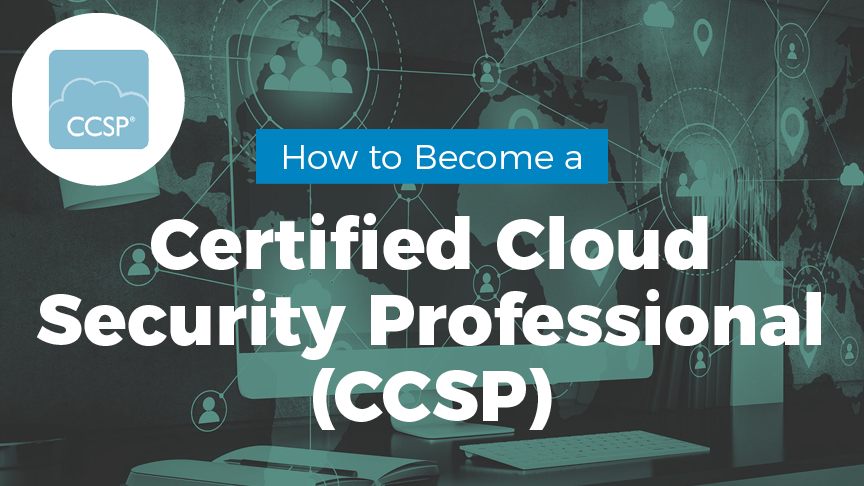Do you want to demonstrate that you are serious about doing what it takes to secure your position as a professional in the cloud security field? This article has important information about how to become a Certified Cloud Security Professional (CCSP), a certification that can help you meet your goal.
The Benefits of CCSP and Why It Matters
The CCSP certification was introduced in 2015, and it now has over 800 testing locations in over 100 countries. To earn the credential, you need to pass the CCSP exam, which confirms that you have the knowledge and capabilities necessary to be considered a specialist in the security industry. Many people in this industry have the appropriate cloud security experience and are competent; however, the CCSP certification validates that skill set. It also shows that you have a passion for learning and the desire to grow as a member of the cloud security profession.
Becoming CCSP certified has other advantages, too. The average salary for a CCSP certified professional in the U.S. is an estimated $117K per year. Plus, after certification, you will be part of an organization that is just over 140,000 members strong.
CCSP Exam Domains
You have a total of four hours to take the 125-question exam, and there are a thousand possible points. You must answer 70 percent of the questions correctly. Here are the six key domains that you must focus on when studying for the CCSP certification.
1. Architectural Concepts and Design Requirements (19%)
This domain covers the security concepts related to the Cloud and infrastructure. You need to understand all the principles related to Cloud computing, Cloud services, and security.
2. Cloud Data Security (20%)
This domain is about understanding the phases of the cloud data lifecycle, along with technology for encryption, masking, tokenization, and data leak prevention. You need to understand storage architectures, such as platform as a service (PaaS), infrastructure as a service (IaaS), and software as a service (SaaS). You also need to understand data threats and the tools needed to help protect the data, like DLP and encryption, along with threats specific to storage types, like data breaches, data leaks, malware attacks, and improper sanitation.
3. Cloud Platform and Infrastructure Security (19%)
This domain is dedicated to physical components of cloud security, and it emphasizes understanding virtualization concepts, networking, management plane solutions, communications, storage, and the core physical environment of the cloud infrastructure.
4. Cloud Application Security (15%)
Cloud application security is broken down into three parts called functions, processes, and data. For the exam, you should understand data sensitivity and data performance. It is also important to know vulnerability concerns, like different types of broken authentication, injection options, security misconfiguration, and even insecure deserialization. This exam domain covers topics like software assurance and verified security software to concepts related to the system development lifecycle (SDLC) while focusing on cloud concepts like cloud architecture to Identity and Access Management (IAM) solutions.
5. Operations (15%)
For this domain, focus on logical design concepts like tenant partitioning designs. Physical designs are also covered as related to risks, such as earthquakes, storms, and other disasters. Also, you have to consider environment designs that involve HVAC, humidity controls, and pathway connections.
6. Legal and Compliance (12%)
This domain focuses on the legal aspects of cloud security and involves concepts related to copyright law breaches in data security and privacy concerns. Included in this topic are state laws, copyright laws, criminal law, and even conflict of laws. There are many legal regulations and controls, such as GDPR, HIPAA, Safe Harbor, Sarbanes-Oxley Act (SOX), and even forensic requirements like ISO/IEC 27043. These concepts continue to expand into jurisdiction variation and as adaptations of the cloud environment, which include external and internal controls. Lastly, it is important to understand the different types of audit reports and know the impacts of risk management.
(ISC)2 Membership
After you receive your certification as a CCSP, you are a part of (ISC)2, a continually growing community of security professionals. Benefits include 50% off official (ISC)2 events, discounts on conferences, professional recognition, member perks, digital badges, a free subscription to the Info Security professional magazine, and expert-instructed webinars.
Ready to Get Started?
If you believe the CCSP is right for you, increase your odds of passing by considering a CCSP study package. When you’re ready to take the exam, create an account at Pearson VUE. Then, choose your specific exam and schedule it at your local testing location. Good luck on your exam!
Posted by: Kaplan IT Training


